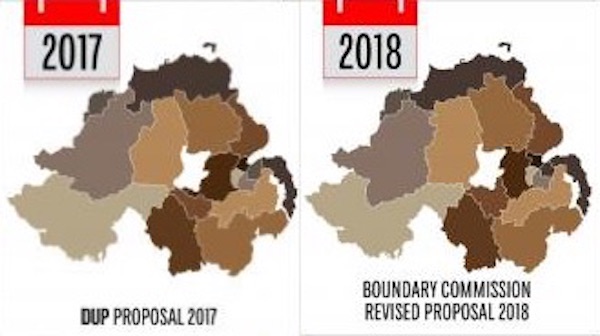
The DUP are behind the redrafting of constituency boundaries to hold onto as much power in the North as possible, writes Sinn Fein MP Elisha McCallion.
Fifty years ago the people of Derry took a a stand against gerrymandering and the denial of equal voting rights to nationalist citizens.
It is appalling that half a century on from the birth of the Civil Rights movement, people are again taking to the streets to demand democratic equality.
But that is precisely what happened yesterday when the people of Dungiven protested against the new electoral boundaries being proposed by the Boundary Commission.
If given the go ahead, these plans will carve the town of Dungiven into three separate constituencies. This is farcical, unnecessary, and completely unacceptable.
But it isn’t just Dungiven that will be affected. The new boundaries, if implemented by the Tory Government, will disfigure and distort the electoral map right across the North. Representation will be denied to thousands of nationalist voters and leave several constituencies without any nationalist representative whatsoever at an Assembly and Westminster level.
That is a democratic affront so it is worth reminding ourselves how this situation came about.
In 2016, the Boundary Commission was established with a remit to reduce the number of constituencies from 18 to 17 and to distribute the electorate in a fair and equitable way across the new constituencies.
The commission initially produced a plan that by and large achieved these key objectives, but they were heavily criticised by the DUP because that party stood to lose out electorally.
The DUP’s Ian Paisley Jr announced that his party “[would] see about that” and submitted their own version of how they would like the new boundary map to look. This DUP proposal sought to maximise the number of DUP elected representatives and minimise the number of nationalists by manipulating electoral boundaries.
In the subsequent period, the DUP entered a self-serving pact to keep Theresa May’s Government in power. And just six months after that deal was signed, the Boundary Commission produced new proposals.
And it is these radically revised plans - which are virtually indistinguishable from the DUP’s - which have hemmed thousands of nationalist voters into constituency’s that no nationalist representative has a hope of ever winning.
The Boundary Commission deny there has been a deliberate gerrymander at the behest of the DUP and stress their independence from political interference.
Nevertheless, they do admit to radically altering their plan, as well as applying the controversial rule seven - known as the ‘gerrymander rule’.
This rule is only available in the north of Ireland and gives the Commission scope to go beyond the usual electorate quotas in any given constituency. Despite ruling out the need to evoke it in their original proposals, the Boundary Commission changed this approach after the DUP argued for it to be implemented.
Indeed, the Commission’s revised report overturned every key decision that underpinned their original proposals, without offering any reasonable explanation as to why.
It is Sinn Fein’s firm view that these changes are unjustifiable and must be overturned.
Votes should be equal. Political representation should reflect the population in any given constituency. These proposals achieve neither of these aims and, instead, effectively deny representation to thousands of nationalist voters.
When the northern state was created, it was deliberately gerrymandered in order to try to guarantee a perpetual unionist majority.
The last Assembly election finally ended that democratic injustice when unionism lost its majority status for the first time since 1921.
Demographic changes are also indicating a nationalist voting majority by 2022, coincidentally the same year when these boundary changes are due to take effect.
But rather than respond to these changing political and demographic trends by reaching an accommodation with their neighbours on this island, it seems the DUP would prefer to re-gerrymander constituencies in order to try to artificially hold onto as much unionist control as they can for as long as possible.
But this isn’t 1968.
We cannot allow them to turn back the clock.
Sinn Fein has submitted our proposals to the Commission which set out a fair and equitable way forward in line with accepted good practice and the Commission’s own remit.
And we are urging members of the public to also make submissions before the consultation closes on March 26.
You can do so by emailing Review@boundarycommission.org.uk or go online at www.bcni2018.uk
If enough of us object, our voices cannot be ignored.
So stand up for fairness in the electoral process and demand that all votes are equal.
This was once the Ireland’s capital city of injustice. We need to send a strong message that there will be absolutely no return to the gerrymandering of the past.
![[Irish Republican News]](https://republican-news.org/graphics/title_gifs/rn.gif)
![[Irish Republican News]](https://republican-news.org/graphics/title_gifs/harp.gif)

